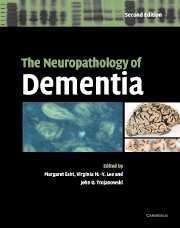Book contents
- Frontmatter
- Contents
- List of contributors
- List of abbreviations
- Preface to second edition
- 1 Definition, clinical features and neuroanatomical basis of dementia
- 2 Important anatomical landmarks in the brain in dementia
- 3 Practical approach to pathological diagnosis
- 4 Morphometric methods and dementia
- 5 Safety precautions in laboratories involved with dementia diagnosis and research
- 6 Molecular diagnosis of dementia
- 7 Neuropathology of the ageing brain
- 8 Neuroimaging Alzheimer's disease
- 9 Alzheimer's disease
- 10 Down's syndrome and Alzheimer's disease
- 11 Sporadic tauopathies: Pick's disease, corticobasal degeneration, progressive supranuclear palsy and argyrophilic grain disease
- 12 Hereditary tauopathies and idiopathic frontotemporal dementias
- 13 Vascular dementias
- 14 Familial and sporadic cerebral amyloid angiopathies associated with dementia and the BRI dementias
- 15 Parkinson's disease, dementia with Lewy bodies, multiple system atrophy and the spectrum of diseases with α-synuclein inclusions
- 16 Huntington's disease
- 17 Human prion diseases
- 18 Alcoholism and dementia
- 19 Hydrocephalus and dementia
- 20 Head injury and dementia
- 21 Infectious (and inflammatory) diseases causing dementia
- 22 Schizophrenia and its dementia
- 23 Other diseases that cause dementia
- 24 Transgenic mouse models of neurodegenerative disease
- Appendix: Dementia brain banks
- Index
22 - Schizophrenia and its dementia
Published online by Cambridge University Press: 12 October 2009
- Frontmatter
- Contents
- List of contributors
- List of abbreviations
- Preface to second edition
- 1 Definition, clinical features and neuroanatomical basis of dementia
- 2 Important anatomical landmarks in the brain in dementia
- 3 Practical approach to pathological diagnosis
- 4 Morphometric methods and dementia
- 5 Safety precautions in laboratories involved with dementia diagnosis and research
- 6 Molecular diagnosis of dementia
- 7 Neuropathology of the ageing brain
- 8 Neuroimaging Alzheimer's disease
- 9 Alzheimer's disease
- 10 Down's syndrome and Alzheimer's disease
- 11 Sporadic tauopathies: Pick's disease, corticobasal degeneration, progressive supranuclear palsy and argyrophilic grain disease
- 12 Hereditary tauopathies and idiopathic frontotemporal dementias
- 13 Vascular dementias
- 14 Familial and sporadic cerebral amyloid angiopathies associated with dementia and the BRI dementias
- 15 Parkinson's disease, dementia with Lewy bodies, multiple system atrophy and the spectrum of diseases with α-synuclein inclusions
- 16 Huntington's disease
- 17 Human prion diseases
- 18 Alcoholism and dementia
- 19 Hydrocephalus and dementia
- 20 Head injury and dementia
- 21 Infectious (and inflammatory) diseases causing dementia
- 22 Schizophrenia and its dementia
- 23 Other diseases that cause dementia
- 24 Transgenic mouse models of neurodegenerative disease
- Appendix: Dementia brain banks
- Index
Summary
Some readers may be surprised to find a chapter with this title in this book, since schizophrenia is not renowned either for its dementia or for its neuropathology. However, recent studies have shown that cognitive impairment is an important feature of schizophrenia (Aleman et al., 1999; Sharma & Harvey, 2000), and that there are neuropathological correlates of the disorder, albeit still poorly characterized (Harrison, 1999a; Harrison & Roberts, 2000).
Cognitive impairment in schizophrenia
Kraepelin, who at the turn of the last century first described the syndrome now called schizophrenia, named it ‘dementia praecox’. However, for many years the cognitive aspects of the disorder were neglected (Johnstone et al., 1978). In recent years, matters have changed, and neuropsychological deficits are now considered an important, perhaps a cardinal, feature of the syndrome. They have clinical relevance, in that they are better predictors of functional outcome than are the psychotic symptoms (Green, 1996), and they are potential therapeutic targets for novel neuroleptic drugs (Harvey & Keefe, 2001). Recent models also postulate that the neuropsychological features are closer to the key pathophysiological and pathogenic processes of the disorder (Goldman-Rakic & Selemon, 1997; Andreasen, 1999). The neuropathological findings to be described may likewise be related more directly to the cognitive deficits than to the psychotic symptoms; this is plausible based upon their characteristics, and given the fact that the cognitive abnormalities are by and large stable (Goldberg et al., 1993), whereas psychotic symptoms wax and wane, often being absent for many years before death.
The neuropsychological impairments of schizophrenia are complex and are only outlined briefly here (for review, see David & Cutting, 1994; Kuperberg & Heckers, 2000; Sharma & Harvey, 2000).
- Type
- Chapter
- Information
- The Neuropathology of Dementia , pp. 497 - 508Publisher: Cambridge University PressPrint publication year: 2004
- 1
- Cited by



